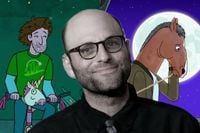Raphael Bob-Waksberg, the creative force behind the acclaimed BoJack Horseman, has returned to the animation world with a brand-new series that is already turning heads. Long Story Short, which premiered on Netflix on August 22, 2025, is quickly establishing itself as one of the streaming platform’s standout offerings, earning a perfect 100% score on Rotten Tomatoes and a renewal for a second season before its debut season even finished airing. But what exactly makes this family dramedy so special, and why are critics and audiences alike singing its praises?
At the heart of Long Story Short is the Schwooper family, a Jewish clan living in Northern California. The name “Schwooper” itself is a playful portmanteau of the parents’ surnames—Schwartz and Cooper—a hint at the show’s offbeat sensibilities and its knack for blending humor with heartfelt storytelling. The series zeroes in on the Schwooper siblings, chronicling their lives from the chaos of childhood in the 1990s and early 2000s through to the complexities of adulthood in the 2020s. This isn’t just a coming-of-age story; it’s a sprawling, nonlinear tapestry that explores how small moments from our youth can echo through the decades, shaping who we become.
Long Story Short’s structure is refreshingly unconventional. Each episode is divided into two vignettes: one set in the siblings’ formative years, and another in their adult lives. This time-hopping format allows viewers to see, sometimes in the span of a single episode, how a seemingly trivial childhood incident can cast a long shadow over adult relationships and decisions. According to Mashable, “Long Story Short’s magic trick is gradually revealing how the events of the cold open have stayed with the Schwoopers for their entire lives, and how they continue to impact their adulthoods.”
The Schwooper siblings themselves are instantly memorable, each drawn with the kind of nuance and specificity that makes them feel both unique and universally relatable. There’s Avi, the eldest and self-proclaimed nerd, who eventually drifts away from the family’s Jewish faith. Shira, the middle child and only daughter, navigates her role as the family’s emotional fulcrum while contemplating starting a family with her partner Kendra. And then there’s Yoshi, the youngest, whose status as the black sheep is cemented by his ongoing quest to find himself—whether that means changing careers or exploring new religious paths. Presiding over this lively brood are their parents: Naomi Schwartz, the overbearing matriarch whose guilt trips are legendary, and Elliot Cooper, the gentle but often overshadowed father.
It’s clear that Bob-Waksberg and his team have poured a great deal of love and attention into crafting the Schwoopers’ world. The dialogue is fast-paced and peppered with inside jokes, and the family’s interactions feel lived-in from the very first episode. “Meeting the Schwoopers is like being wrapped in a hug that goes on just a tad too long: It’s warm and fuzzy, but a lot all at the same time,” writes Mashable. The show doesn’t shy away from the messiness of family life, but it tempers its more painful moments with a healthy dose of absurdity—think wolves invading a school campus, or Yoshi getting roped into selling mattresses that come in tubes. These zany storylines never feel gratuitous; instead, they serve to highlight deeper truths about the Schwoopers and, by extension, about all families.
Visually, Long Story Short is a treat. Its vibrant, hand-drawn animation style evokes illustrated storybooks and childhood doodles, lending the series a sense of whimsy and nostalgia. But don’t be fooled by the bright colors—this is a show that’s unafraid to tackle heavy themes. Like BoJack Horseman before it, Long Story Short deftly balances humor and heartbreak, often within the same scene. The result is a viewing experience that’s both entertaining and emotionally resonant.
The voice cast is a veritable who’s who of television comedy, featuring Lisa Edelstein (House), Paul Reiser (Mad About You), Ben Feldman (Superstore), Abbi Jacobson (Broad City), Max Greenfield (New Girl), Angelique Cabral (Life in Pieces), Nicole Byer (Brooklyn Nine-Nine), Dave Franco (The Studio), and Michaela Dietz (Steven Universe). Their performances bring depth and warmth to the animated characters, making the Schwoopers feel like a real family you might bump into at a Northern California farmer’s market.
Critics have been quick to heap praise on the series. As reported by ScreenRant, Long Story Short currently boasts a perfect 100% rating on Rotten Tomatoes, based on 26 reviews. The critical consensus highlights the show’s unique ability to “tackle complex subjects in a zany and unique tone.” This blend of the somber and the silly is something Bob-Waksberg has perfected over the years, most notably with BoJack Horseman, which itself maintained a near-perfect score through much of its run. Mary Kassel’s review for ScreenRant echoes this sentiment, noting that while Long Story Short may not feature anthropomorphic animals or Hollywood satire, it is “comparably devastating” in its exploration of family dynamics and personal growth.
The show’s early success has not gone unnoticed by Netflix, which renewed Long Story Short for a second season even before the first had finished airing. This move signals strong confidence in Bob-Waksberg’s vision and in the show’s ability to connect with viewers. In a crowded field of adult animated series—Netflix’s current slate includes Love, Death & Robots, Blue Eye Samurai, and several genre-heavy titles—Long Story Short stands out precisely because it is so grounded. Rather than relying on high-concept sci-fi or fantasy, it finds drama and comedy in the everyday messiness of family life.
Of course, it helps that Bob-Waksberg has a proven track record. BoJack Horseman, which ran from 2014 to 2020, redefined what animated television could be, blending sharp satire with deeply personal storytelling. Long Story Short builds on that legacy, but carves out its own space by focusing on the universal experience of growing up—and growing older—within a family that is both loving and, at times, deeply dysfunctional.
As the Schwooper siblings navigate the joys and pitfalls of adulthood, viewers are invited to reflect on their own family histories. The show’s nonlinear approach serves as a poignant reminder that our past is never as far behind us as we might think. “Each episode collapses the past into the present, until the Schwoopers’ adult and child selves may as well be co-existing on screen,” notes Mashable. It’s a storytelling technique that feels both innovative and deeply human.
With its perfect critical score, renewal for a second season, and a voice cast brimming with talent, Long Story Short is poised to become a defining series in the new era of adult animation. For anyone who’s ever laughed, cried, or cringed at a family gathering, the Schwoopers’ story is sure to strike a chord.



